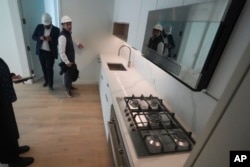Officials in many American cities say they want companies to turn empty office buildings into housing.
These housing plans, known as office-to-housing conversions, can help downtown business areas that became empty as a result of the COVID-19 pandemic.
Some policy makers consider conversions a way to increase the supply of less costly, or affordable, housing. Critics doubt the positive effects of these changes.
The push to change office buildings to housing
In the fall of 2022, the Congressional Research Services, or CRS, released a report. The report noted that housing costs in the United States have become a big issue. That is because housing prices are high, housing supplies are limited, and mortgage interest rates are rising.
The report noted that there have been some increases in new house building activities. But problems related to rising building costs and the availability of labor and materials remain.
At the same time, vacancy rates at downtown office buildings continue to rise. Vacancy rates show how much unused office space there is. The real estate business CBRE said the vacancy rate was 12.2 percent in the last three months of 2019. The number increased to 17.8 percent in the first three months of 2023. Some places with the lowest use of office space include San Francisco with a vacancy rate of 29.4 percent, Houston at 23.6 percent, Philadelphia at 21.7 percent and Washington, D.C. at 20.3 percent.
As a result of limited housing supply and the increasing number of empty office buildings, a number of cities are offering lower taxes for building developers. These tax breaks aim to increase office-to-housing conversions. One requirement is that a set percentage of apartments are offered at below-market prices.
In January, Pittsburgh announced it was accepting ideas to produce more affordable housing through the “conversion of...underutilized office space.” Underutilized means that the space is not being used.
In October, Boston released a plan aimed at improving downtown. The plan included a push for more housing, some of which would come from office conversions.
And Seattle in Washington state launched a competition in April for downtown building owners and design companies to come up with conversion ideas.
In Washington DC, Mayor Muriel Bowser wants office-to-housing conversions to help repopulate the downtown area. Her plan, announced earlier this year, seeks to add 15,000 new residents downtown, adding to the approximately 25,000 who already live here.
“We’re not going to have as many workers downtown as we had before the pandemic,” Bowser said earlier this year. “Our job is to make sure that we are getting more people downtown.”
Questions
But critics have doubts about the conversion push.
Housing advocates worry that the affordable housing requirements could be reduced or pushed aside.
Even supporters of the conversions say that giving tax breaks to big developers is not the best tool to reach their goals.
“Developers who feel it’s going to benefit their bottom line will do it without an incentive,” said Erica Williams, director of the D.C. Fiscal Policy Institute. “This is a very costly proposal for an unproven program.”
And, as increasing numbers of employers turn to hybrid work, some question whether people will want to move to downtown areas if they are not required to work in an office every day.
Last January, Pittsburgh Mayor Ed Gainey said at the United States Conference of Mayors meetings in Washington “You have to make downtown a neighborhood — somewhere that’s living and playful and active.”
Chuck D’Aprix of Downtown Economics, a development advisory company, said it can be difficult to get new residents in former downtown business areas. The businesses that residents need are different from the businesses needed by daytime office workers.
Such businesses include less costly food stores, childcare centers, pet supply shops, hardware stores and auto repair businesses. And those places need to stay open past office hours.
“A lot of those services simply aren’t available right now in small city downtowns or mid-sized city downtowns, you know, they close up at night,” D’Aprix said.
I’m John Russell.
Mae Anderson, Ashraf Khalil and Michael Casey reported on this story for the Associated Press.
_____________________________________________________________________
Words in This Story
conversion –n. the process of changing something from one use to another usually through updating or rebuilding some of it
mortgage – n. a legal agreement in which a person borrows money to buy property (such as a house) and pays back the money over a period of years
vacancy –n. an unused space for housing or office work that is also not creating income from rent or sale
advocate –n. a person who argues for a cause or policy
benefit – v. to be useful or helpful to (someone or something)
incentive – n. something that encourages a person to do something or to work harder
hybrid – adj. something that is formed by combining two or more things (for example, office work and remote work)
resident –n. a person who lives in a certain place







Forum